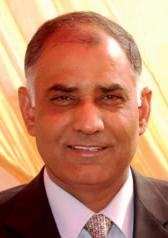
AMHERST, MA–Two teams of international researchers led by Om Parkash, agriculture biotechnologist at the Stockbridge School of Agriculture, and Richard Peltier, environmental health sciences, have been awarded funding from the Worldwide Universities Network (WUN) to initiate global projects designed to ultimately impact millions of people in the developing world, Umass Amherst said in a statement.
Parkash will lead a Climate Resilient Open Partnership for Food Security (CROP-FS) team, which includes 12 experts from six institutions in China, India, the United Kingdom and the U.S. The goal of CROP-FS is to develop research strategies that will enable major food crops to grow under more extreme environmental conditions, such as drought, high temperature and irrigation with brackish or sea water.
In collaboration with agricultural and plant scientists at Zhejiang University in China, Jawaharlal Nehru University in India, and the Universities of Leeds, Southampton and York in the U.K., Parkash and his colleagues Baoshan Xing, Klaus Nusslein and Laurel Smith-Doerr at UMass Amherst will approach the problem of developing climate-resilient crops in three related ways:
• Exploring the effect of climate change on soil matrix and employ soil amendments such as biochar and other organic matters to increase soil moisture content and carbon sequestration.
• Studying the effect of changing climate on microbial communities in agricultural soils and their impact on crop yields and strategies to improve rhizosphere activity.
• Understanding the physiological and molecular basis of adaptation to drought, heat, and heavy metal stresses likely resulting from climate change, and targeting promising candidate genes and enzymes to improve crops’ ability to produce better yield under multiple environmental stresses.
Peltier’s Air Sensors Everywhere project aims to develop a framework for distributed systems of low-cost air pollution sensing hardware and software that can be used to address a global pandemic responsible for millions of premature deaths and altering the global climate balance. The team includes 14 experts from 13 institutions in Australia, Bangladesh, Canada, Germany, Ghana, Nepal, the United Kingdom and the United States.
Air Sensors Everywhere will produce open-source and freely available software, coupled with hardware that is both inexpensive to obtain and easy to assemble, for pilot demonstrations in developing countries. These resources will be provided freely to project collaborators, as well as to anyone with Internet access, with the goal of ultimately empowering millions of people to build upon these developments and construct a highly scalable and utilitarian instrument base capable of answering a wide range of questions on worldwide air quality.
“This is a truly innovative research project that will have major impact in both the public health and climate change spheres,” said John Hearn, Executive Director of WUN. “The captivating element is the fact that it will provide open-source, scalable information to millions of people and empowering communities.”
Total support for each project, including WUN funds and matching amounts by participating universities, exceeds $52,000.
This is UMass Amherst’s first year as a member of WUN, an 18-university global higher education and research network spanning 10 countries on five continents that is dedicated to developing innovative solutions to some of the world’s most significant challenges. The seed grants from WUN’s Research Development Fund will enable the projects to build an initial track record to attract long-term funding from the public sector, foundations, and industry.
In recognizing the grants, Elizabeth Chilton, associate vice chancellor for research and engagement, and the UMass Amherst coordinator for WUN, said, “These projects represent two fine examples of the breadth of talent and vision that UMass Amherst researchers bring to the challenge of helping to address global challenges. Our faculty members look forward to collaborating with academic partners around the world in many ways. Our university’s membership in WUN gives them an excellent platform for finding partners and teaming up on important projects such as these.”















